The World Health Organization chief warned Tuesday that Washington's decision to withdraw from the U.N. health agency was dangerous for the United States and the rest of the world alike.
 Full Story
Full Story
The British government said Thursday that a memorial wall in London created by those who lost loved ones during the coronavirus pandemic will be preserved.
In a statement, it said that the 8-foot-high (2½-meter-high) Portland stone wall on the south side of the River Thames, directly opposite the Houses of Parliament, will remain to commemorate the 240,000 or so virus-related deaths in the U.K., as well as honor the sacrifice of key workers, particularly in the health and care sectors.
 Full Story
Full Story
The World Health Organization said Wednesday it was appalled at reports of more than 460 people being killed at a hospital in the Sudanese city of El-Fasher, recently taken over by paramilitaries.
 Full Story
Full Story
In a spot outside Berlin that's usually a paradise for birdwatchers, volunteers have recovered nearly 2,000 dead cranes in recent days as bird flu has hit the migrating birds hard.
 Full Story
Full Story
Doctors have long known that heat puts a strain on the heart, kidneys and other organs. Those risks are exacerbated for pregnant people, as the body's processes for staying cool are altered.
 Full Story
Full Story
The Health Ministry announced overnight that nine new Tannourine mineral water samples taken from the Lebanese market have tested free of bacteria.
The Ministry however noted that it is yet to receive the results of tests conducted on water samples taken from the company’s production line.
 Full Story
Full Story
Nine Tannourine Mineral Water samples sent to the state-run Lebanese Agricultural Research Institute have tested free of bacteria and authorities are awaiting results from the state-run Industrial Research Institute and the American University of Beirut in order to take the appropriate decision, Agriculture Minister Nizar Hani said on Thursday.
The Health Ministry had on Monday suspended Tannourine and ordered its products pulled from shelves after samples tested positive for the pseudomonas aeruginosa bacteria.
 Full Story
Full Story
Health Minister Rakan Nassereddine said Wednesday that the Tannourine Mineral Water company has been suspended for “purely technical” reasons, lamenting the politicization of the file.
In remarks to LBCI television, Nassereddine clarified that the Ministry’s Epidemiological Surveillance team had received a complaint alleging the presence of contamination in Tannourine’s bottled water.
 Full Story
Full Story
The Tannourine Mineral Water company on Tuesday stressed that its bottled water meets the country’s health and safety standards, after the Health Ministry ordered its suspension and the removal of its products from the market over a detected bacteria.
“The sample that was relied on was not collected according to the applicable norms,” Tannourine’s CEO said at a press conference, noting that the sample was taken in the absence of any company representative and that the related test that was conducted makes the results inaccurate and invalid.
 Full Story
Full Story
The Health Ministry on Monday suspended the operations of the Tannourine Mineral Water company, ordering that its water bottles be pulled from the market due to their contamination with the pseudomonas aeruginosa bacteria.
 Full Story
Full Story



